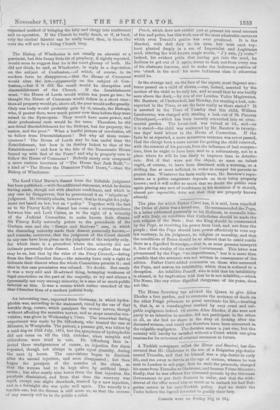The Lord Chief Baron's dissent from the Ridsdale judgment has
been published,—with the additional statement, which he denies baying made, though not with absolute confidence, and which in any case he disapproves, that he pronounced it an " iniquitous " judgment. He virtually admits, however, that he thought it a judg- ment not based on law, but on "policy." Together with the fact as to Sir Fitzroy Kelly's dissent has come out a correspondence between him and Lord Cairns, as to the right of a minority of the Judicial Committee to make known their dissent. Sir Fitzroy Kelly naturally points to the precedents of the Gorham case and the "Essays and Reviews" case, in which the dissenting minority made their dissent personally known,— and remarks, moreover, that the judgment of the Court should in any case have been given as the judgment of the majority only, for which there is a precedent 'where the minority did not intimate personally their dissent. Lord Cairns replies that that may be so, but that by the rules of the Privy Council,—dating from the Star-Chamber time,—the minority have only a right to intimate their dissent when the whole Committee permits it ; and that in this case permission was refused. No doubt. But surely it was a very odd and ill-advised thing, betraying weakness of legal conviction on the part of the majority, to try and silence a (personally not very strong) minority, in a ease of so much public interest as this. It was a course which rather smacked of the Star Chamber than of a modern judicial body.


































 Previous page
Previous page